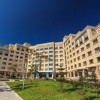The presenter will describe the current socio-cultural context of the EFL education in Russia caused by quickening globalization, computerization and the increasing importance of language education for an effective intercultural communication. This new learning environment focused on worldwide communication in different spheres, easier access to knowledge, a greater role of a learner in the educational process brought about changes in the Russian ELT theory and classroom practice. The main approaches that are being implemented now while teaching EFL in Russia are characterized, on the one hand, by learner-centeredness, communicative and socio-cultural orientation, integration of content and language learning but, on the other hand, by standards and competency-based orientation that very often undermine the atmosphere of creativity and spontaneity and leads to the students’ fear of failure. There is no ideal solution to this contradiction but one thing seems to be clear: a modern teacher designing a 21st century classroom should be able to address all the components of the current educational situation, namely: teaching goals, learners’ needs and differences, recent pedagogical technologies and forms of classroom work, resource availability, appropriate assessment tools and many more). Taking into account the complexity and largeness of the problem the presenter will mainly discuss the challenges and opportunities of innovative pedagogical technologies that are currently used by Russian school and University EFL teachers and share her own experiences of using various Web resources, including mobile ones, for developing communicative and professional skills of the pre-service EFL teachers studying at the Teacher Training Institute of the Pacific National University in the city of Khabarovsk, the Russian Federation.
-
July 2025 M T W T F S S « Jun 1 2 3 4 5 6 7 8 9 10 11 12 13 14 15 16 17 18 19 20 21 22 23 24 25 26 27 28 29 30 31 -
AsiaTEFL – FEELTA 2016
-
FEELTA Far East Teachers Association Theme Song






